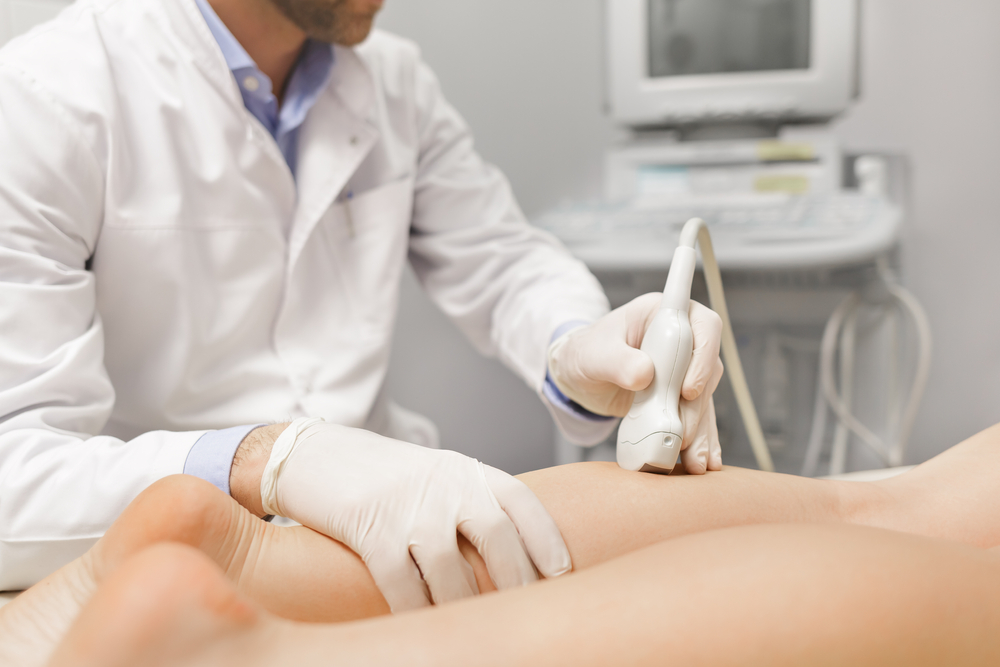When you have varicose veins and are thinking about treatment, one of your first questions will probably be what kind of doctor treats varicose veins. This is important to know as there are plenty of choices to consider.
However, when it comes to the best varicose vein doctor, you’ll want to choose a vascular surgeon. We’re covering why varicose veins need specialized care and how to choose the right doctor for you.
Understanding Varicose Veins and the Need for Specialized Care
Varicose veins are bulging, twisted veins that are often blue or purple and commonly occur in the legs. For many people, varicose veins are more than just a cosmetic concern. They can also indicate underlying health issues.
There can be several potential causes of varicose veins, but they primarily occur when the valves within them don’t work correctly, causing blood to pool and veins to enlarge. As for what varicose veins feel like, they may initially appear harmless and annoying. However, they can lead to discomfort, swelling, and even more severe complications like blood clots or ulcers if left untreated [1].
That’s why specialized care is crucial for managing varicose veins effectively. Medical professionals like vascular surgeons or interventional radiologists have the expertise to assess the severity of underlying vein conditions and recommend appropriate treatment options. Treatment plans may include lifestyle changes, compression therapy, or minimally invasive procedures.
Types of Doctors Who Treat Varicose Veins
Due to potential complications, it’s important to make sure you choose an appropriate doctor to alleviate your symptoms and prevent them from worsening.
Vascular Surgeons
Vascular surgeons are considered the best varicose veins specialists as they focus on the diagnosis and treatment of disorders affecting the blood vessels, including peripheral artery disease (PAD), deep vein thrombosis (DVT), and varicose veins [2].
Vascular surgeons are skilled in performing traditional and minimally invasive surgical interventions. Of all types of vein doctors, they can offer the widest range of varicose vein treatments.
Our team of vascular surgeons at Empire Vein & Vascular Specialists offers a range of vein services to choose from depending on your personalized needs, including:
- VenaSeal™: This is the first vein treatment of its kind, using medical adhesive to seal off affected veins.
- ClosureFast™: This option uses radiofrequency applied using a narrow catheter and small incision and only requires local anesthetic for quick recovery time.
- Sclerotherapy: This treatment eliminates spider and smaller varicose veins by injecting a sclerosing solution called Asclera, which causes the vein to seal.
- Phlebectomy: Using tiny incisions and local anesthesia, your doctor will remove large veins from your leg in small sections.
- Compression Stockings: If a non-invasive option makes more sense, fitted compression stockings provide gentle pressure to your legs and improve blood flow. They are most beneficial during activities that cause you trouble, like sitting or standing for long periods.
Interventional Radiologists
Interventional radiologists use advanced imaging techniques — like X-rays, ultrasounds, or MRIs — to diagnose and guide minimally invasive treatments for varicose veins.
These specialists are most likely to offer treatment options like laser therapy or radiofrequency ablation.
Phlebologists
Phlebologists are trained in the diagnosis and management of vein disorders, including varicose veins. They may offer a range of treatments, like sclerotherapy.
Dermatologists
Dermatologists can also help treat varicose veins, particularly when associated with skin changes or complications like venous ulcers.
Keep in mind that dermatologists specialize in skin health and may be able to offer treatments like sclerotherapy or laser treatment [3].
Choosing the Right Varicose Vein Doctor
Now that you know who treats varicose veins, it’s important to make sure their experience, expertise, and treatment options align with your needs. First, ensure the doctor is board-certified and has specific training in vein disease. Consider asking for referrals from your primary care provider or a close friend who has undergone varicose vein treatment.
Check out the options around where you live and set up in-person consultations. This provides the opportunity to meet them and establish a personal rapport, see what the facility feels like, and understand suggested treatment plans. Be sure to confirm whether your insurance coverage applies to their plan and that other financial-related questions are answered.
It’s also helpful to find reviews of specific facilities and doctors for varicose veins. Read through the feedback to get an idea of how others feel they were treated — including post-procedural complications, complaints about communication or service, and overall experience.
Preparing for Your Consultation with a Varicose Vein Doctor
Start by making a list of your varicose vein symptoms and concerns. This might include pain, swelling, discomfort, or changes in the appearance of your skin or veins. Make notes of how long you’ve been experiencing such symptoms.
Having your relevant medical history readily available is also helpful, including any previous surgeries, medications you regularly use, and whether your family has a history of vein disorders.
On the day of your consultation, wear loose-fitting clothing. This makes it easier for the provider to examine your legs. Bring a list of questions about your condition, options for treatment, potential risks and benefits, and expected outcomes. You can also ask about the doctor’s specific experience treating vein conditions.
If you’re interested in pursuing varicose vein evaluation and treatment with one of our board-certified doctors, we invite you to call us at 1-800-827-4267.
References
- Varicose Veins. National Heart Lung and Blood Institute. Updated 26 Sep 2023. Available from: https://www.nhlbi.nih.gov/health/varicose-veins
- Chang S, Huang Y, Lee M, et al. Association of Varicose Veins With Incident Venous Thromboembolism and Peripheral Artery Disease. JAMA. 2018;319(8):807–817. doi:10.1001/jama.2018.0246
- Leg Veins: Why they appear and how dermatologists treat them. American Academy of Dermatology Association. (n.d.). Available from: https://www.aad.org/public/cosmetic/younger-looking/how-dermatologists-treat-leg-veins
